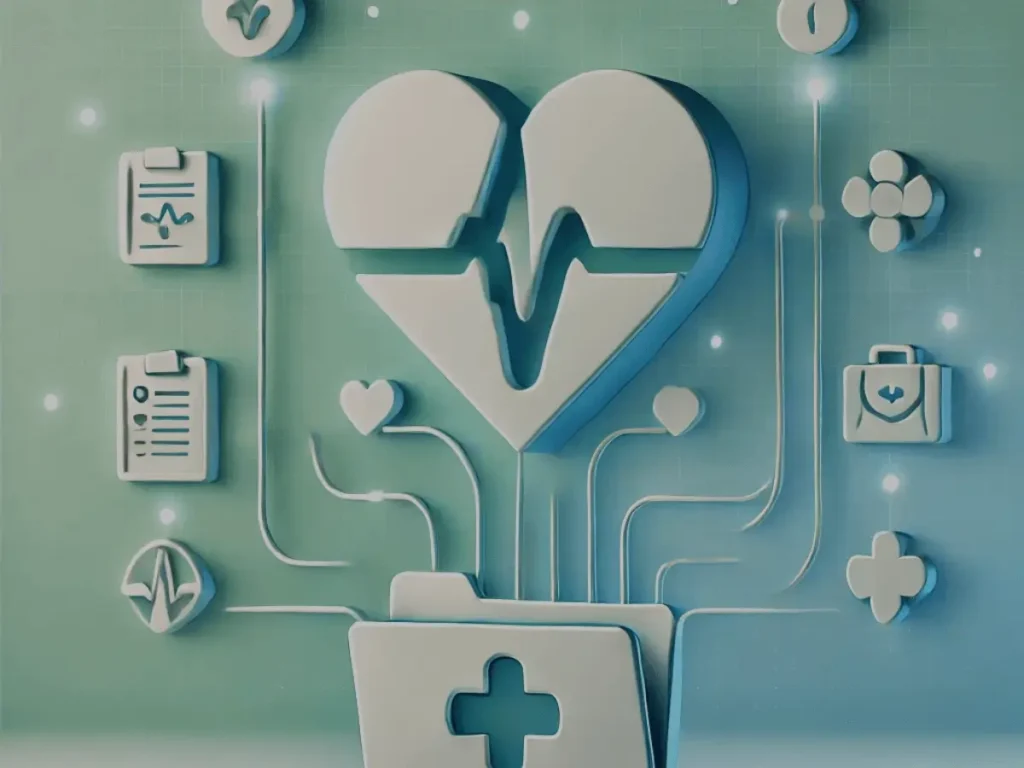Healthcare delivery in 2024 is practically unrecognizable from a few years back. The incorporation of advanced systems such as EHR, mHealth, predictive modeling and health information systems has raised the bar in the industry. Such changes are increasing efficiency and improving patient care as well. There are top 13 benefits of EHR in healthcare for providers and patients.
The health care industry would not be relying on electronic health records systems as they are now. The statistics stand at 90% of UK office-based physicians, 78% of US office-based physicians, and , all depend on the EHR systems to enhance efficiency and performance. These systems are a prerequisite to any medical attention that is offered in today’s world.
The unification of Artificial Intelligence (AI) into EHR systems has taken their capabilities to a different level. AI assists in handling large-scale data with focus on patients, automating various stages of a workflow, and giving practitioners easy tools that can be utilized to make necessary actions. This technology is crucial in tackling complex challenges in healthcare.
EHR and EMR systems already maintain fair share of important data yet still as the healthcare system offers more pressure the intelligence tool needs to be there. The practitioners are calling it what it is and the directives explain what needs to be done which make them more user friendly and easy to use on a routine basis.
Shaping the Future
As the healthcare industry undergoes rapid changes, EHR systems will remain at the forefront of innovation. Their continued evolution will be essential in delivering smarter, more efficient care for patients worldwide.
Key takeaways
- 13 benefits of EHR in healthcare for providers and patients.
- The implementation of EHR systems in the United Kingdom and the United States of America has changed the way healthcare services are offered in these regions as efficiency has been highly boosted, errors are minimized and improved services are offered to patients.
- Patients are now able to interact more actively and enjoy better results, while providers have an opportunity to lower costs, work processes effectively and operate within the law.
- There is a better decision making and management of healthcare since the combination of EHR systems with Artificial Intelligence and predictive analysis optimizes the healthcare systems.
- Even though high establishment expenditure is incurred when implementing the EHR systems, long term benefits in return on investment can be realized due to better operational efficiency, higher levels of compliance and satisfaction levels among patients.
Benefits of EHR Systems in Healthcare for Providers and Patients
Healthcare delivery has immensely changed with the introduction and more detailed application of Electronic Health Records (EHR) systems Recent advancements in the EHR technology have witnessed a proliferation and integration of applications owing to the projected growth of the global EHR market expecting to increase by $54.7 billion from 2024 to 2028.
In the USA, around 78% of office-based physicians and around 96% of hospitals have adopted the EHR technology. In the same breath, in the UK, the National Health Service (NHS) has unified the patient’s folders in medical practices of many organizations. This article presents 9 arguments that explain the importance of EHR systems for the providers and the patients from these regions.
What are EHR Systems?
EHR systems enable users to securely capture, collect, and exchange information about the health of patients. They help to eliminate an overreliance on traditional paper-based records and help to enhance the healthcare services offered by providers in the USA and the UK.
EHR and EMR systems in healthcare both play different role.
13 Benefits of EHR in Healthcare for Providers and Patients
Improved Workflow Efficiency
Patient documentation is made easier with the aid of EHR systems which in turn enhances operational workflows within the facility. In the UK, the NHS employs EHRs to facilitate the scheduling of appointments, routine email communication and cancellation.
Also, USA health care providers enjoy the reduced cataloging processes and the quicker retrieval of medical files of patients. The assignment of tasks such as Billing, issuing of prescriptions, and documenting is automated hence saving time and reducing probable errors.
Improved Quality of Care
The patient data intake and the speed of performance of a doctor’s work is absolutely vital. In the case of an emergency, the system allows for quick understanding with access to EHR.
Such systems are also available in the UK and the USA healthcare providers and allow them to give right and targeted services to clients. According to a survey, 75 in every 100 physicians in the United States have a perception that EHR systems are of help in facilitating the quality of the healthcare provided to patients.
Uncontrolled Medical errors
In USA alone, medical negligence contributes to an average of 251000 deaths every year and in the UK, it is not uncommon. Information regarding the past undiagnosed patient condition reduces the chances of these errors by EHR systems.
Evidence of previous conditions such as allergies and current medicines taken can all be shown on one page. This results in prescribing safer medications and better treatment and outcomes of the illness.
Compliance Regulations and Data Protection
There is regulation in place on data protection and confidentiality in UK EHR systems that are similar to the USA HIPAA regulations. These encourage illegal breaches of patient information not to happen.
In the USA, a breach at Premera Blue Cross cost $6.85 million, while the UK’s GDPR fines have risen significantly. EHRs protect healthcare organizations from legal penalties and reputational damage.
Increased Provider Productivity
By automating routine tasks, EHR systems free up healthcare providers to focus on patient care. Built-in templates streamline documentation, enhancing staff productivity.
In both the UK and USA, EHR solutions have reduced time spent on paperwork, enabling providers to see more patients.
Facilitates Secure Data Sharing
EHR systems allow secure sharing of patient data across facilities and specialists. In the UK, the NHS has implemented interoperable EHR systems, improving care coordination.
In the USA, providers use secure platforms to exchange health information, enhancing collaboration and reducing redundant tests.
Cost Savings for Providers
EHR systems save costs by reducing paperwork, storage expenses, and redundant testing. In the USA, healthcare providers save millions annually by digitizing records.
Similarly, the NHS in the UK has reduced administrative costs by adopting centralized EHR systems.
Advanced Analytics and Reporting
EHR systems provide actionable insights through data analytics. Healthcare providers can monitor patient trends and evaluate treatment effectiveness.
In both the UK and USA, EHR systems support population health management, enabling proactive care and improved outcomes.
Integration with AI and Predictive Modeling
Incorporating Artificial Intelligence (AI) enhances EHR systems’ functionality. AI-powered tools help analyze vast patient data, enabling predictive modeling and early diagnosis.
The integration of AI in EHRs is transforming healthcare in both the USA and UK, making processes smarter and more efficient.
Key Benefits of EHR Systems for Patients
Improved Health Outcomes
EHR systems improve care coordination, ensuring patients receive timely and accurate treatment. A report reveals that 76% of USA patients believe EHRs positively impact their healthcare.
In the UK, EHR systems have streamlined patient care, particularly in NHS hospitals, by providing quick access to comprehensive health records.
Enhanced Patient Engagement
EHR systems give people a voice by enabling them access to their health information. Functions such as patient portals enable people to check the records, book the appointments and discuss with the providers.
In US and UK, this higher involvement in care leads to better relationships between patients and providers and also leads to the people being more active in seeking healthcare.
Reduced Cost of Service for the Patients
EHR systems enable the patients to cut down unnecessary testing and procedures. Doctors are able to see prior test results with a few clicks alleviating the need for repetitive tests.
In the UK, this is providing the NHS with a great advantage in efficiently managing resources and providing effective care. Likewise, in the US, patients incur lesser costs in healthcare as there is no repetition of services.
Improved Quality of Care in Emergencies
EHR systems enable health care providers access to relevant information and documents during acute interruptions. This wards off delays and helps in quick and proper making of decisions, especially when time is of the essence.
USA and UK healthcare systems make use of EHRs to transform the outcomes and timing of emergency care.
Overcoming EHR Challenges
While EHR systems have numerous benefits, initial costs and maintenance can be concerns. In both the USA and UK, smaller practices may find these systems expensive to implement.
However, choosing a reliable EHR vendor ensures transparency in pricing and long-term value. Vendors often include training, support, and system updates, maximizing the return on investment.
The Future of EHR Systems
The adoption of EHR systems in both countries continues to expand due to the interconnectivity of technology, AI and data security. The integration of such systems into the industry ensures that healthcare developments will always come first.
Both providers as well as patients, do see EHR systems as an essential activity that brings the healthcare sector to the stage where it is more integrated and designed around the patients.
These 13 benefits of EHR in healthcare for providers and patients will also give insights to the readers to better understand.
Conclusion
There has been progress recorded in an implementation of EHR systems in USA and UK that has changed the course of history for the better, for both the patients and the providers. Reduced numbers of medical errors and better workflow efficiency, as well as increased patient involvement and adherence to the requirements imposed these systems have proved effective and necessary in today’s healthcare system.
In the eyes of the providers, EHR systems optimize process, reduce cost, and improve management processes. In the eyes of the patients, they provide better care, improved participation, and lower costs. Future developments in EHR systems will be enhanced using AI, predictive analytics, and further data-sharing capabilities.
How AI Culture Empowers Your Practice with EHR Solutions
AI Culture is one of the companies to bring AI technology to the medical field and now you can see how to expand your healthcare practice to the next level. We have worked for more than 4 years helping medical organizations. Here we are utilizing the power of the EHR systems to enhance their operational efficiency and patient care services.
Also, we have team of healthcare technologists who are well versed with the problems. We provides encounter in different regions both in the United Kingdom and United States. We do not only create your practice EHR systems, but we also make sure they are easy to use.
Our Products and Services Include
- Automation of Administrative Tasks: paperwork for scheduling, billing, and prescriptions becomes a thing of the past.
- Decrease In Medical Errors: doctors diagnoses and prescriptions are more effective due to the availability of patient data and decision support systems.
- Increase in Efficiency: according to research, 81% of professionals consider EHR systems to be very effective in increasing efficiency of work processes.
- Improved Revenue Cycle: features such as intelligent EHR systems help in enhancing workflows and reducing costs.
Take the next step and join the many healthcare providers who are enjoying the benefits brought by the EHR systems.








